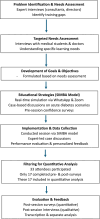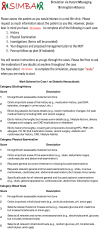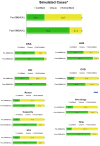Simulation-based training significantly improved confidence and clinical skills of resident doctors in acute diabetes management
- PMID: 40526722
- PMCID: PMC12352711
- DOI: 10.1111/dme.70068
Simulation-based training significantly improved confidence and clinical skills of resident doctors in acute diabetes management
Abstract
Aims: The joint consensus of the American Diabetes Association and the European Association for the Study of Diabetes highlights the need for practical, up-to-date training in acute diabetes care. Therefore, this session aimed to develop an applied learning intervention that identifies key gaps in acute diabetes training, assesses participants' change in confidence in managing these scenarios following the intervention and evaluates participants' satisfaction and the intervention's relevance to practice.
Methods: To design the programme, we adopted Kern's six-step curriculum development framework. Clinical experts were interviewed to assess general needs, and students and resident doctors were interviewed to assess targeted needs. The SIMBA (Simulation via Instant Messaging for Bedside Application) model was adopted to develop cases alongside generative AI and expert input. Pre- and post-session surveys assessed participants' confidence, while the latter also assessed satisfaction and relevance to practice.
Results: 33 participants attended the session. 17 participants completed both pre- and post-session surveys and were included in the study. Simulation performance scores averaged 4.0/5 for history taking, interpretation and clinical judgement; 3.9/5 for physical examination and investigations; and 3.6/5 for management. Confidence in managing acute diabetes scenarios improved significantly (pre vs. post: 33.3% vs. 78.4%, p < 0.001). 94.1% strongly agreed the cases were relevant, and 82.3% preferred this teaching method over traditional approaches.
Conclusion: The model identified the need for targeted education on physical examination, investigations and management specific to acute diabetes scenarios. Simulation-based education significantly enhances confidence and is perceived as highly relevant for training in acute diabetes management.
Keywords: DKA; Inpatient diabetes; clinical diabetes; medical management; professional education.
© 2025 The Author(s). Diabetic Medicine published by John Wiley & Sons Ltd on behalf of Diabetes UK.
Conflict of interest statement
The authors declare no conflicts of interest.
Figures



References
-
- Kangas S, Jaatinen P, Metso S, Paavilainen E, Rintala TM. Students' perceptions of interprofessional collaboration on the care of diabetes: a qualitative study. Nurse Educ Pract. 2021;53:103023. - PubMed
MeSH terms
Grants and funding
LinkOut - more resources
Full Text Sources
Medical

